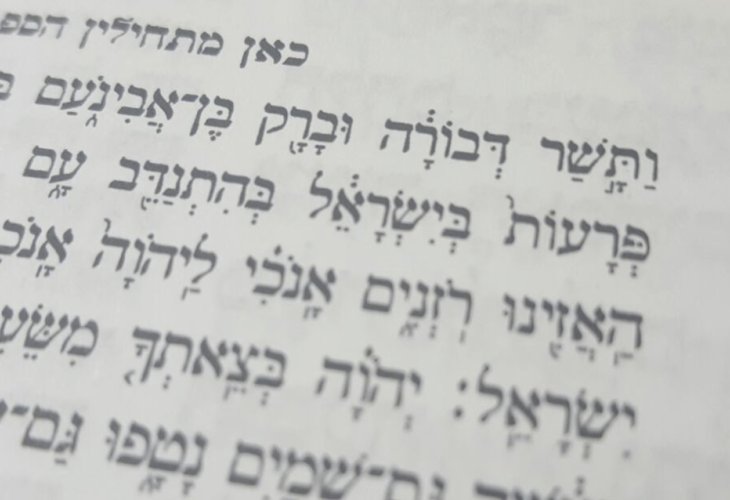Torah Personalities
7 Fascinating Facts About Deborah the Prophetess
She led Israel for 40 years and was one of the seven prophetesses. Deborah initiated a war against Jabin and Sisera. Discover seven intriguing facts about Deborah, whose song is read in this week's Shabbat portion.

1. Deborah was one of the seven prophetesses of Israel. She served as the fourth judge of Israel after the deaths of Ehud ben Gera and Shamgar ben Anat, around 1124 BCE. As explained in Yalkut Shimoni: "I call heaven and earth as witnesses, whether a Gentile or an Israelite, man or woman, servant or maidservant, all are worthy of the Holy Spirit according to their deeds." This implies that a woman can also attain divine inspiration, depending on her actions.
2. According to the Book of Judges, Deborah judged Israel while sitting under a palm tree located between Ramah and Bethel. She took this precaution to avoid seclusion with the men who came to be judged by her. Deborah was affluent, owning palm groves in Jericho, vineyards in Ramah, olives in Bethel, and fields in the mountains.
3. In the Bible, Deborah is referred to as "the wife of Lappidoth". This nickname arose because her husband, Barak, was an uneducated man, and she assisted him with his Torah studies. It is stated: "Deborah's husband was unlearned. She said to him, 'Come, and I will make wicks, and you shall bring them to the Temple in Shiloh, so that your share will be among the righteous, and you will come to life in the world to come. And she made the wicks, and he brought them to the Temple.'"
Rabbi Emmanuel Mizrahi - The Remarkable Story of Deborah the Prophetess
4. After the previous judges died, the Israelites continued to act wickedly in the eyes of Hashem. As punishment, Hashem delivered them into the hand of Jabin, the King of Canaan, who ruled at "Harosheth of the Gentiles." Jabin oppressed Israel harshly for 20 years, and they feared rebelling because he had 900 iron chariots.
5. Deborah initiated the battle against Jabin, King of Hazor, and his general Sisera, together with Barak ben Abinoam. She sent messengers to call Barak and instructed him, through prophecy, to go to Mount Tabor with 10,000 soldiers from the tribes of Naphtali and Zebulun to fight Jabin and his army leader Sisera. "Hashem will make Sisera go down to the Kishon River to fight you, and there Hashem will deliver him into your hands." Barak gathered the tribes of Zebulun and Naphtali and ascended Mount Tabor.
6. The battle was accompanied by miraculous events, as described in the Song of Deborah. Sisera learned that Barak had arrived with his troops at Mount Tabor, so he gathered all 900 iron chariots and came to the Kishon River. Deborah instructed Barak: "Though the battle at the river will be difficult, do not fear. Go down to the river since today Hashem will deliver them into your hand." Barak descended from Mount Tabor to the Kishon River with his soldiers, leading to a significant miracle: Hashem caused chaos in Sisera's camp, leading to the downfall of Sisera's soldiers before Barak's troops. Not a single soldier of Sisera's remained – except Sisera himself, who fled on foot from the battlefield. On his escape, he passed the tent of Yael, the wife of 'Heber.' Yael invited him to rest in her tent, offered him milk to drink so he would fall asleep, and once he was asleep, she killed him with a tent peg and hammer. Hence, Yael was blessed as "most blessed among women of the tent."
7. 'The Song of Deborah' is one of the ten songs in the Bible, composed by Deborah after the miraculous victory. Deborah's song is the regular Haftorah of the portion Beshalach, which includes the Song of Miriam after the parting of the Red Sea.
Related Topic:
Who was Deborah the Prophetess?
Enjoyed the article? Learned something new? Tell us in the comments.

